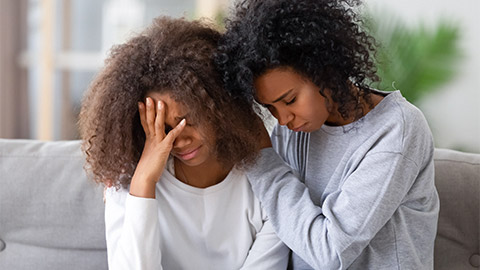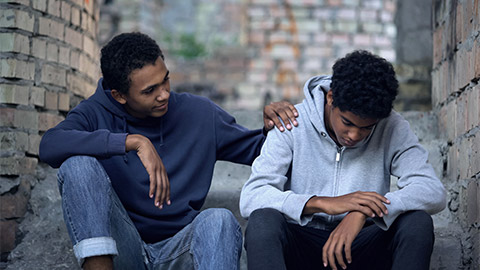It is almost inevitable that a young person will experience the death of someone close to them – a family member, a friend or someone they knew well – during their journey into adulthood.
Grief is a very personal experience for all of us and we each grieve in their own way. However, there are some common threads in how children and teenagers respond to loss and grief depending on their developmental stage, as well as what support can be most effective. It is important to know how to support rangatahi or taiohi who are coping with bereavement.
In this topic, we focus on the effects of bereavement and grief on young people and on the various ways young people behave when responding to, or coping with, their loss. We will also look at how different kinds of loss other than bereavement can still have a significant impact on the life of a young person.

Impacts of loss and bereavement
Bereavement is difficult for anyone, but young people can be hit especially hard by the death of someone close to them.
Because of their age, young people are likely to heavily rely on more than one person – parents, grandparents, older siblings, other caregivers or members of their wider whānau – for their basic needs. When one of those people dies, in addition to the emotional and mental strain of losing someone who means a lot to them, that young person can be materially affected in the following months or years, or be affected socially, as a result of this loss.
For example, the death of a parent could mean a sudden reduction in income for the household. The family won’t have as much money to spend on sports, hobbies or other activities that the young person used to enjoy. The young person may suddenly have responsibilities or obligations placed on them to look after their younger siblings, do more housework or get a job in order to help pay the family’s bills. The family may need to move to a different suburb or town, meaning the young person ends up going to a new school or has greater challenges with transport to see friends in their old neighbourhood.
These different stresses can have the effect of magnifying their impact. In that same example, the barriers preventing this young person from spending time with their friends or doing activities they enjoy will also make it harder for them to process their grief.

The effects of grief on young people
When a young person loses someone close to them, how they grieve this death will depend on many factors, including their age and developmental stage, gender, personality, family circumstances, relationship with the person who has died, and previous experiences with loss or death. The young person’s reaction will be influenced by the ways they usually deal with stressful or emotional situations, and they will also take cues from how others around them are grieving.
Children tend to worry about survival, especially if they have lost a parent or other primary caregiver. They can become worried about their own survival as well as growing more concerned about the safety of the remaining parent or caregiver.
Teenagers may not be inclined to express the extent of their feelings of grief because of the developmental stage they are in, where they are moving from being dependent on their family to relying on their peers for guidance.
Here are some common grief reactions for teenagers1:
- Having difficulty concentrating or remembering things
- Being withdrawn and needing more time to themselves
- Feeling overwhelmed by intense emotions that can arise suddenly
- Attempting to conceal how upset they are by putting up a front
- Worrying about their own safety or the safety of other people who are important to them
- Losing self-esteem or confidence, or feeling embarrassed
- Headaches, stomachaches or other physical symptoms
- Acting out or being irritable
- Changes in eating and sleeping habits
- Developing depression and/or having suicidal thoughts
Are there other behaviours that you would expect from grieving teenagers that are not on this list? From your personal experience, do you have a sense of which grief reactions are more common among the age range of the young people you work with?
Explore further
If you are not already familiar with the Skylight Trust, you should spend some time exploring the many free resources they provide on their website 2. Skylight is a not-for-profit organisation that supports people to overcome life’s challenges and build resilience against grief, loss, trauma and abuse.
Here is a good example: Skylight has collected over 40 figurative descriptions of what grief feels like, from children, teenagers and adults, and published them as a hand-out3. Download the 4-page PDF ‘Grief is like …?’ and read through the descriptions – which ones ring true to you?
It is not only the death of a person that can cause a young person to experience grief. Here are some other kinds of loss that young people experience, all of which can lead to grief:
- break-up of parents’ relationship
- break-up of their own relationship with a romantic partner
- loss of childhood home
- loss of relationships with whānau
- parental incarceration
- death of a childhood pet.
As you can see from this list, some of these losses can occur together or trigger each other. For instance, as a result of their parents ending their relationship, a young person may also have to move out of the house they grew up in. They may become physically distanced from one of their parents, and they may lose touch with some of their siblings or other whānau as a result of this.
Many young people experience their first significant romantic relationship in their teenage years, and when that relationship comes to an end it can cause profound grief. A relationship like this is often a significant part of the young person’s self-identity as well as their other social relationships, meaning that the end of the relationship can also lead to a loss of their sense of self or their peer group.
Think about other kinds of loss that could lead to grief in young people. Are there any you can think of that should be added to the list above?

It is one thing to gain a better understanding of how bereavement and loss affect young people, or to develop empathy for young people who are experiencing prolonged or complicated grief – but it is another thing to be able to provide help.
Unless you are qualified to do so, it is not appropriate for you to try and diagnose depression or offer grief counselling. You may want to suggest to a young person that they talk to their GP or look into counselling, but you should discuss this with your manager or supervisor beforehand to make sure the advice and support you offer is appropriate for your workplace and your role.
And while you may really want to be able to support every young person you work with who is visibly going through a hard time, it can be difficult to help someone if they are showing anger and hostility, feeling hopeless, sabotaging relationships or resisting offers of assistance. Unfortunately, these behaviours can also be some of the signs that the person is struggling.
Some things you can do to be supportive is to be present and listen to the person if and when they want to share their feelings with you. Give them permission and plenty of time to express their grief. Acknowledge their loss(es) but do not offer judgement – they need to feel safe in expressing their grief.
Explore further
Read this page on grief on the Health Navigator New Zealand website 4. There are ideas for how someone can try and cope with their grief – some of these strategies might be useful to suggest to the young people you work with.
You might feel very limited in how much you can do to make things better for a young person who is struggling with overwhelming grief, but if you can empower them to learn some healthy coping strategies you will have made a difference.
Are you confident you have a good understanding of how young people may respond to experiences of grief and loss, and what we can do to support them through these experiences?
- What can it mean for a young person to lose someone close to them?
- What behaviours might you expect to see? What are some signs that a young person might be struggling and need support or help?
- As someone who works with young people, what can you do when you suspect or know that a young person has experienced a loss and may be struggling to cope with their grief?
You are now ready to complete Task 2 of Assessment 1.2.
There are many pieces of legislation that are relevant to youth workers and those working with youth.
The Children’s Act 2014 seeks to bring children and young people’s safety to the forefront5. An example of a practical aspect of this would be that all people who work with children and young people are now required to be Police vetted.
The Oranga Tamariki Act 1989 relates to the processes of keeping children and young people safe (care and protection pathway) and holding young people accountable for their actions (youth justice pathway)6. As a youth worker you may have a young person who you are supporting that is involved with Oranga Tamariki.
It is important to know that the Children’s Commissioner Act 2003 is there to help protect children and young people, especially those in care and who are most vulnerable7. It is also there to make sure that the New Zealand government’s policy is in line with international legislation such as the United Nations Convention on the Rights of the Child (UNCROC).
Children’s Act 2014
This new law, along with amendments to the Children, Young Persons, and Their Families Act 1989, were brought in to improve the lives of the most vulnerable children in New Zealand by introducing better protections against abuse and neglect both in their homes and in the community.
One example of such protections is the mandatory safety checks now required for people who work with children (up to 17 years) for state-funded organisations.
Oranga Tamariki Act 1989
This Act used to be known as the Children, Young Persons and Their Families Act 1989 before its name was changed in 2017. This legislation makes Oranga Tamariki (and ultimately the Government) responsible for the well-being of the children most at risk of harm, and it sets out how the state can intervene to protect children from abuse and neglect. Oranga Tamariki is also responsible for youth offenders and children of the state, and this Act determines how the state can address child and youth offending.
Children’s Commissioner Act 2003
This Act reformed the Office of the Children’s Commissioner, whose functions include:
- monitoring and assessing services provided to children in the state’s care
- advocating on issues that affect children and young people
- raising awareness of the United Nations Convention on the Rights of the Child (UNCROC).
UNCROC is an international human rights treaty that New Zealand is required to implement and report on8. You can read this overview of the rights given to everyone under 18 years of age by the Children’s Convention. The rights outlined in this convention place obligations on any organisation in New Zealand that works with children
Talk with your supervisor or a more experienced colleague about how these pieces of legislation apply in your workplace or to your role.
- What do these laws protect or how do they serve the interests of young people in your workplace?
- What do you need to do or know about, in order to be compliant with this legislation?

